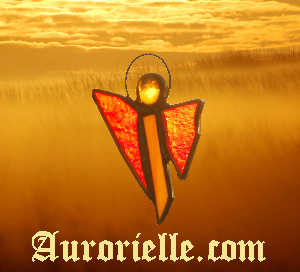But as the gathered knights await the feast,
a whistling wind blows open heavy doors;
the startled guardsmen struggle with the gusts,
and beech mast scatters all around the hall
with sundry other out-of-season fruits
that never should be seen in leafy spring.
All turn to see what else the breeze will bring -
untimely yellow leaves and straggling roots
come skidding in. A heaven-zephyr's call,
one might have thought. The company mistrusts
this wind, that scorns all nature's normal laws
and acts as if the natural seasons ceased.
A whinnying sounds loud, but far; deep beats
of hooves across the ground announce some knight
comes galloping amidst the murky mists,
and every muscle tenses round the hall
except the king's. "Stay, knights; what shall God bring?
This Pentecost, some wonder did I seek
to test our mettle; so we must expect
the unexpected. Let the peril come."
No sooner had he spoken than a form
appeared in mist afar; some devil's work?
But just like any normal, mortal horse
it gallops, canters, trots, then slows to walk,
ent'ring the hall. Then no one dares to talk,
who laughed at life, however fierce the force
of war, and never sought from strife to shirk,
who sallied from his castle through the storm;
but each and every knight sits still, struck dumb,
in shock; before the portal sits erect
a man of war in panoply unique,
of whom the minstrels' riddle is to sing
some song to summon up his form at all.
For none that now compare with him exists,
and every one that saw him swears the sight
all manner of description still defeats.
The doors bang loose; the horseman bends to bow,
green as the laurel wreaths around the wall.
The fire quails in its grate. The noble knights,
sat by the table weighted with the feast,
stiffen their sinews. Gallant is their guest,
'tis clear; but by what soul his form's possessed
that fills a speaking tree, or by what beast
his form is guided, no-one now recites.
Except his shadow, black and standing tall,
all else of him was green, from toe to brow.
His horse, all brown as chestnuts dressed in spikes,
was clothed with cloth all steeped in deepest jade,
and arched its mighty neck as if the air
blew in the boughs of hoar, enormous trees;
yet by those knightly crooked, creaking knees
might rest the heads of lords in armour fair,
so great that stallion's lofty limbs were laid,
beyond the reach of foemen's ready pikes.
No cobbles clack; no shoes adorn this horse;
no bit of iron checks the mighty steed.
No reins to train the creature, nor to guide,
no stirrup, neither saddle ease the ride.
Metal, or any leather are indeed
not in the rider's nature - all of course
proceeds as trees would dream of making man,
resisting every inch the iron's strike,
except one brazen bright and blazing blade -
a shining sword star-sparkling from his arm.
Knotted and gnarled, his staff bears many scars,
tall as the lords in armour sat beside
the table made of trees that once grew green,
grew great and green and leafy in the land.
This stranger might have been some brother bold
of forests fresh and far where Fay roam free,
living 'midst friends, a mighty creature-tree,
by leaves alone kept free from winter's cold,
'midst evergreens no woodsman ever planned,
in forests deep and dark no Celt had seen,
nor Saxon sought a hall in which to bide
beneath the solitude of circling stars.
No, not for him the fetters of a farm,
formed by a man despite what nature made;
if anything should cause his cold dislike,
then that would be whatever men might plan.
With all the knights still staggered by the sight,
he rests his staff against the cobbled floor,
giving the shaft a swift and twisty spin -
then springs like bending bough to grasp the ground
between his toes, like roots that sink through stone.
His legs, twin trunks, support his heavy bole.
What heart should beat within so strange a soul,
no man of Logres yet had ever known.
Thick sinews like the mistletoe surround
his throbbing arms that pulse with sap within;
and no-one cares to ask his name - far more,
he is his name; his name, Green, greenest Knight.
Thick twigs all twirled together form his beard;
moss-green, the leafy shadows swathe his face.
Grey-green, like trunks of trees, his noble neck,
his eyes all lit with em'rald sparkling light.
And thus he comes to seek the strangest fight -
to find a knight whose honour knows no speck,
and calls it worse than death to know disgrace,
or let another know just once he feared.
|

